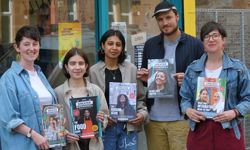Put the kettle on!
I'm not surprised Condé Nast in New York is closing down its intern programme. The company is dealing with two law suits brought by people who spent time in the offices of W magazine and The New Yorker and felt that they weren't adequately compensated. It's an assertion which is commonly made about all kinds of companies.
I can understand how somebody in this situation might feel aggrieved. I can see they might want to go and talk to somebody about it. I can appreciate they might decide that in financial terms they'd be better off working in Starbucks or saving the transport costs and staying at home.
What I can't for the life of me understand is why they would take the step of going to law about it, thereby making sure that the first mark they make in the very small world of magazines is as the person who took Condé Nast to law. That's not because Condé Nast are bullies. It's because most magazine companies have got quite enough challenges without inviting new ones in that they don't need. That may be met by the righteous indignation which is the common currency of today's social media but it's what every senior person in publishing will be thinking.
Most magazine people looking at this story will say that yes, it is a shame that unpaid or lowly paid internships on magazines ensure that only the offspring of the comfortable or well-connected get a foot in the door. They will also say, because they will know, that most interns go through a long period of being a drain on a magazine before they become what might arguably be described as a net contributor to that magazine's effort. They know that there are far more people trying to get jobs as interns than the average magazine has room for, even if they were inclined.
These days, there is less that they can do. In the old days interns (or "workies", as they were less pretentiously known) could be asked to tidy up the back issues or re-type the copy of the kind of eccentric freelancers who would write on cornflake packets (I am not making this up) or nip round to picture agency and take transparencies back. Since the communications revolution, these simple physical tasks have been automated and the first thought of most editors confronted by an intern is "what do I get them to do?" The second thought is, "I hope they take a long time doing it".
This might have careers teachers or university lecturers faint with indignation but it's the truth. Business may sometimes be taking advantage of all this keenness but they are far too stretched to sit down and build a plan based upon it.
I would advise all people doing work experience to concentrate on making tea because at least they'll be able to see people drinking it. That way they'll know it's working. You might think you're proofreading or checking copy or "doing research" – and this might be what you tell the judge – but the editors who gave you those tasks were far too experienced to place any trust in your discharging them satisfactorily. It's only when you can be trusted to do something on your own that you have a value.
Making waves
The best piece I read about the recent contretemps about Ed Miliband's father and Paul Dacre was not in the heavy papers. It was on the website of Vice, which is the kind of title which in the recent past would have been patronised with the name "style magazine" but is now finding that it's got as much right to speak its mind about anything that takes its fancy. It was headlined, "The Death Of The Daily Mail - How It Might Play Out". The great thing about Vice is they're the daily embodiment of the wisdom "sometimes right, sometimes wrong, always certain".
Vice started life as a listings magazine called the Voice Of Montreal but now operates all over the world as a magazine, programme provider and impresario behind such bizarre events as the visit of Dennis Rodman to North Korea to talk basketball and celebrity with Kim Jong-Un. Vice is living proof of the fact that you are as big and influential as the advertisers believe you to be. I suspect the original investors, who have been recently joined by such old media vampires as Rupert Murdoch, don't quite know what to do next and they'll probably look back on this as their purple patch.
For the moment, they have the kind of raw vigour and self-belief that the tabloids used to have before they lost their nerve. Witness headlines like "The Baddest Grandpa In The World", "Dinner With The Ferret People" and "This Guy Is Losing His Virginity In Public For An Art Project". I wonder if they'll come under Leveson's already passé definition of what constitutes a newspaper.
Party time
I went to the RBS building in Bishopsgate, there to reflect once more on how come bank head offices have the best views and the largest amount of internal space and to watch Condé Nast boss Nicholas Coleridge pick up the Marcus Morris Prize from the PPA. Terry Mansfield read out an entirely fictitious letter of application from the 15-year-old Coleridge and reminded us that he used to work with the Reverend gentleman who gave the prize its name, who unbelievably pounded the pavements of London until he found one publisher who was prepared to put out his Eagle comic. In finest log-rolling fashion, Nick named Terry as one of the seven people who had influenced his career. From Terry he learned, among other things, the fact that advertisers are deeply appreciative of anyone who shows his face at their parties. If you go to any expensive publishing party in London you can be almost guaranteed that Nick will have either just turned up or just left. He seems to have done rather well by it. (Pictured, L-R: Kevin Hand, Nicholas Coleridge, Terry Mansfield, Barry McIlheney.)
The School of Hard Knocks
If you hang around long enough then the unconsidered trifles you turned out when you were young end up as the subject of somebody's PhD dissertation. I spoke to one such candidate about a teenage magazine only the other day. I always get the feeling the truth is a disappointment to academics because it doesn't fit into one of those grand narratives about the way society is supposed to work. The first thing they find puzzling is that making a living by selling a product to the public is very hard indeed. So hard indeed that when you find it's going well, you tend not to mess with it. They also don't really believe that your knowledge of the market is won not with any great insight but with a thousand battle scars, each one sustained as a result of a tiny wrong decision.
Forerunner of the web?
In the 60s and 70s, student rag magazines were popular, often so popular that certain particularly hot issues still changed hands years later. They were mostly made up of old jokes. Remember when jokes were rare? Some of them were new ones, written by people who thought they were going to be the next Eric Idle, but mostly they were old ones you'd never heard before. Because the people doing the rag magazines had A levels and didn't like to think of themselves as completely superficial, the jokes would be interrupted from time to time by an opinion column, usually by a prematurely world weary 20 year-old angry and indignant on behalf of somebody they'd never met. But then you'd turn the page and there would be a funny picture of an animal torn from a newspaper re-presented with a caption about the Head of Catering. Then you'd turn the page again and there would be a girl in the nude and maybe a competition to see who had the biggest rack on campus. You obviously wouldn't get the competition anymore but in every other respect that was the internet, wasn't it?












